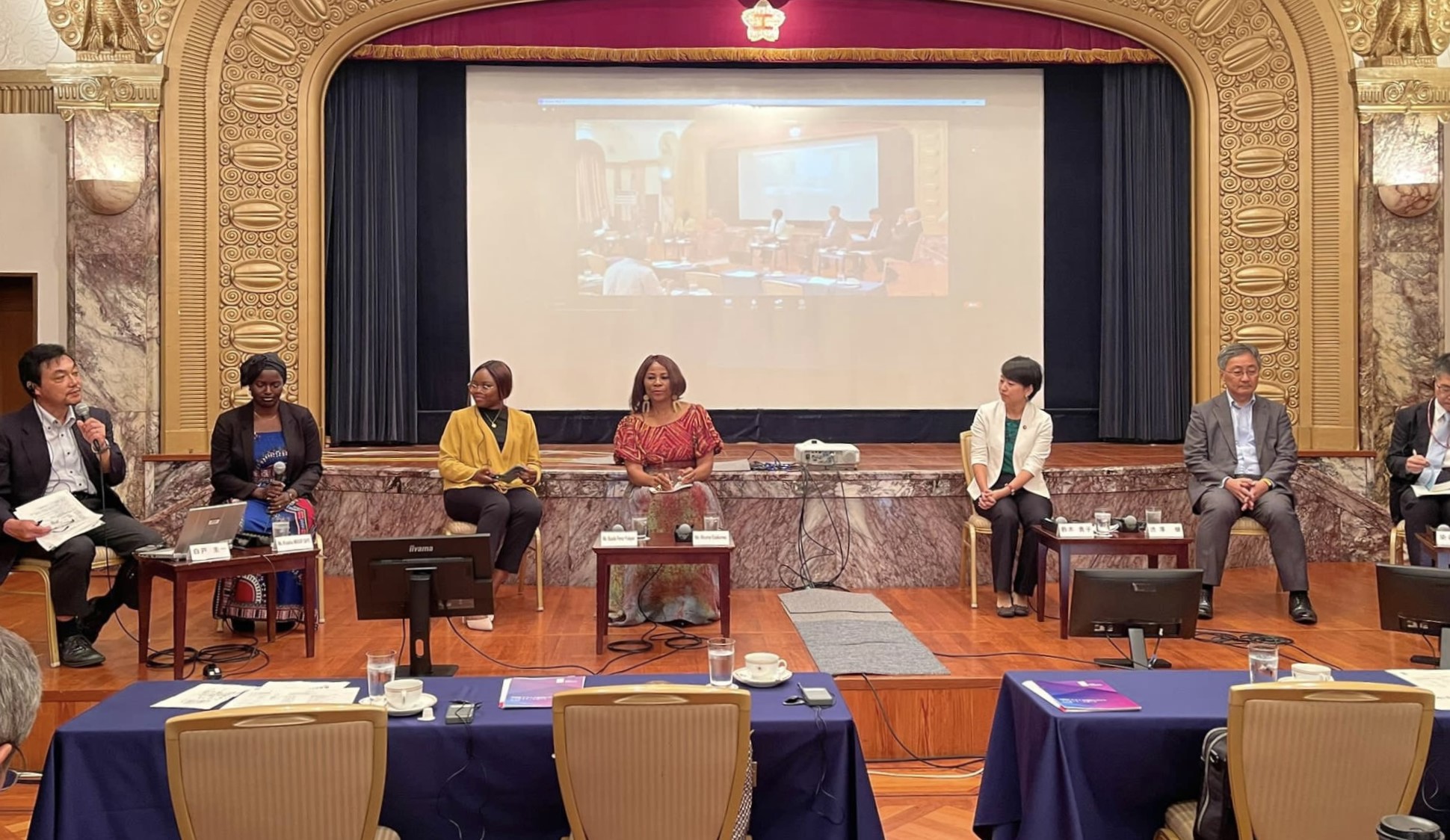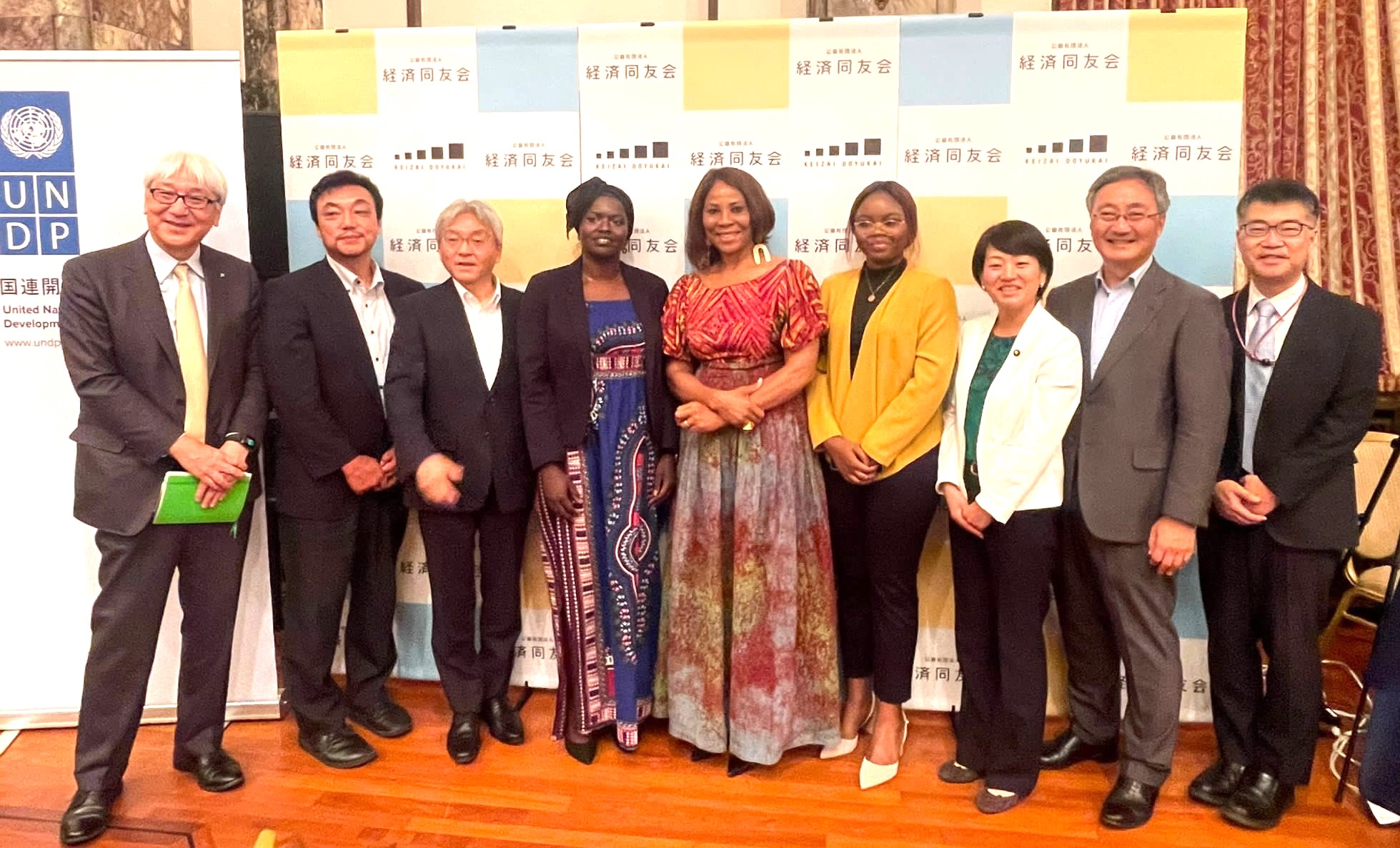Public-private partnerships are instrumental in empowering the youth of Africa, catalyzing socio-economic transformation. This exploration delves into the key takeaways from the "Japan-Africa Youth Entrepreneurs Forum" and underscores the immense untapped potential within Africa's human capital.
Unlocking Africa's Youth Potential: Public-Private Partnerships and Collaborations
October 13, 2023

Panel discussion during the session
Public-private partnerships to support youth empowerment and business initiatives in Africa are considered essential, particularly by Japan. Various programs have been implemented to provide support to African youth, but further acceleration is required to encourage socioeconomic transformation in both Africa and Japan.
UNDP has been actively involved in supporting a comprehensive program called "YouthConnekt." This initiative aims to connect youth with role models, peers, resources, technologies, skills, and economic opportunities to create an empowering environment. In addition, UNDP advocates for the essential role of youth in the African Continental Free Trade Area (AfCFTA).
In line with these efforts, the collaborative "Japan-Africa Youth Entrepreneurs Forum" was organized in August 2023, jointly hosted by KEIZAI DOYUKAI (Japan Association of Corporate Executives) and the United Nations Development Programme (UNDP). Moderated by Mr. Keiichi Shirato, Professor at Ritsumeikan University, the forum focused on supporting youth entrepreneurs and their role in socio-economic transformation. It aimed to foster cross-sector collaboration, contributing to preparations for TICAD 9 in 2025.
Mr. Mutsuo Iwai, Vice Chairman of KEIZAI DOYUKAI and Chairperson of the Board of Japan Tobacco Inc., opened the event by underscoring Japan's growing partnership with Africa as TICAD commemorates its 30th anniversary this year. "Japanese business leaders are increasingly recognizing the untapped potential within Africa. It is imperative to redirect our focus towards impassioned and enterprising young entrepreneurs, acknowledging Africa's latent capabilities and the evolving partnership between Japan and Africa," said Iwai.
Ahunna Eziakonwa, Assistant Administrator and Regional Bureau Director for Africa, UNDP, underlined their collaborative efforts with DOYUKAI to promote dialogue and collaboration with Japanese companies, focusing on tangible outcomes before TICAD 9 in 2025. She stressed the crucial role of youth in Africa's economic transformation and emphasized that women and youth should be integral to the process, not an afterthought. Eziakonwa also emphasized UNDP's strategy of enhancing cooperation through AfCFTA and knowledge transfer, stating, "Africa is a place for learning, not just teaching. Let's educate Japanese youth about Africa to foster a dignified partnership," said Eziakonwa.
A panel discussion was opened up to include entrepreneurs from Africa, a prominent politician, and representatives from business and academia. Mr. Keiichi Shirato, Professor of the College of International Relations at Ritsumeikan University, as moderator, added his own experiences and statistics, drawing valuable input from the panelists and creating a forum for active discussion.
Ms. Takako Suzuki, a Member of the House of Representatives, emphasized the importance of individuals including parliamentarians visiting Africa personally. "It is different when one ventures into Africa driven by personal will, compared to a case of transfer order given in a large corporation. While expertise and knowledge from experienced individuals are crucial, there is a need to cross-match passionate individuals and business partners." She also underscored that the concept of charity is outdated when considering the future relationship between Africa and Japan. TICAD has made progress, and our focus should be directed towards forging partnerships.
During the discussion, Dr. Takao Someya, Executive Director and Vice President at the University of Tokyo, highlighted the increasing focus on entrepreneurship within the university. "This shift signifies a departure from the traditional path where top talents would pursue bureaucratic careers to now encouraging them to venture into their own businesses. The university witnessed the emergence of 46 startups last year and aims to increase this number to ten times. The key areas of prioritization include globalization in collaboration with the Global South, deep tech, and empowering social entrepreneurs," said Someya.
Mr. Kazumasa Kimura, Executive Officer and COO for Africa Division New Business Development of Toyota Tsusho Corporation, explained from good practice that when investing in startups in Africa, it is important to focus on areas that match the company’s strengths and local needs, and startups can take an essential role of bridging services from the company to customers. Kimura also explained the organizational change of Toyota Tsusho in order to actively pursue business in Africa, including the existence of a dedicated Africa Division. He also stressed the importance of a prompt response to safety and compliance issues.
Mr. Ken Shibusawa, Chairman of the Global South - Africa Committee at KEIZAI DOYUKAI and CEO of Shibusawa and Company, as well as CEO of &Capital, emphasized the untapped potential of human capital in the African continent. He noted, "A decade ago, I identified explosive growth potential, likening it to a blue ocean opportunity, especially when considering Japan's limited investments in Africa." Shibusawa also acknowledged the challenge of balancing problem-solving and economic returns, introducing a unique fund by Keizai Doyukai members for Africa. He emphasized the importance of collaboration in Africa and the youth's adaptability. The fund aims to support the young generation for the next three decades.
Ms. Busola Perez-Folayan, a scholar of the African Business Education Initiative and a student in the Master's program at the Graduate School of Law, Kyushu University, stressed Africa's diverse strengths and the importance of capacity-building programs based on her experience as an innovation hub CEO in Nigeria. Perez-Folayan emphasized, "Enhancing collaboration between African startups and Japanese companies is vital, with a focus on joint decision-making and discussions to foster meaningful partnerships." She also expressed optimism for increased investment in Africa, citing the region's vibrant entrepreneurship and thriving startup ecosystem.
Ms. Aïssatou Mboup Gaye, a student pursuing a doctoral course in solar energy engineering at Tokyo University of Agriculture and Technology, COO of Aisha Consulting, and CEO of Hinomi221 in Senegal, emphasized the necessity for platforms that connect Japanese businesses with African youth entrepreneurs. These platforms would facilitate mutual exploration of investment opportunities, resource sharing, and win-win partnerships. Additionally, historical inspiration was noted as essential to reflect on Japan's own history during the Showa era and identify the specific needs of African countries.
The panel highlighted how the primary challenge faced by startups in Africa is not investment but rather a knowledge gap. Shibusawa stressed the importance of embracing failure in business and adjusting policies to allocate funds with the assumption of failure for startups, noting that many of today’s leading Japanese companies were startups 150 years ago, where failure in business was nothing special.

Group photo: left to right – Mr. Mutsuo Iwai, Mr. Keiichi Shirato, Mr. Kazumasa Kimura, Ms. Aïssatou Mboup Gaye, Ahunna Eziakonwa, Ms. Busola Perez-Folayan, Ms. Takako Suzuki, Mr. Ken Shibusawa, Mr. Takao Someya

 Locations
Locations
